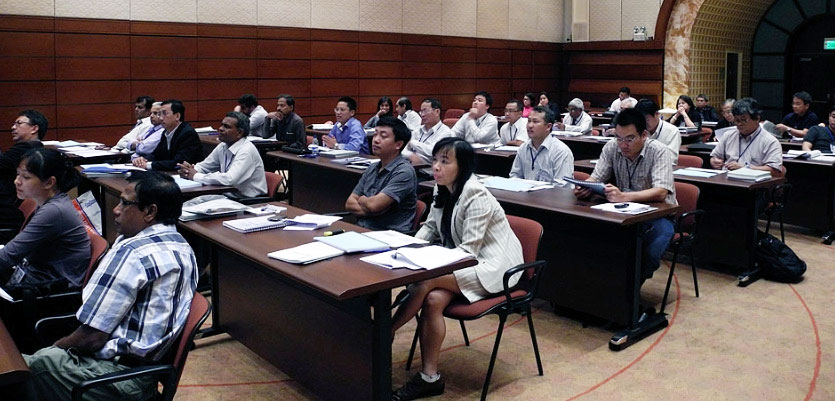 Japan International Cooperation Agency (JICA) recently conducted its FIDIC (Fédération Internationale Des IngénieursConseils) Contracts training workshop last August 13-17, 2012. The five-day workshop was organized by Nippon Koei, Co., Ltd. and took place at the Asian Development Bank Building (Auditorium Zone C) in Mandaluyong City.
Japan International Cooperation Agency (JICA) recently conducted its FIDIC (Fédération Internationale Des IngénieursConseils) Contracts training workshop last August 13-17, 2012. The five-day workshop was organized by Nippon Koei, Co., Ltd. and took place at the Asian Development Bank Building (Auditorium Zone C) in Mandaluyong City.
The workshop was divided into two modules, the practical use of FIDIC Contracts and the management of claims and resolution of disputes. Geoffrey Smith, a solicitor and engineer as well as an Accredited International Trainer of FIDIC, lectured for four days on the FIDIC contract terms and construction adjudication. Yukinobu Hayashi, General Manager of Nippon Koei Co., Ltd. and Vice Chairman of the Professional Training Committee of the Association of Japanese Consulting Engineers (AJCE), and Yoshihiko Yamashita, Secretary General of the AJCE, spoke to the participants on the first and last days of the training.
The first module covered FIDIC Contract concepts and principles, responsibilities of the main parties, management of projects, financial clauses and procedures, and risk, force majeure and termination. The second module covered managing variations in FIDIC Contracts, notices and claims procedures, contractor’s claims, claims for delay, claims for additional payment, employer’s financial claims, and procedure for resolution of disputes.
In addition to the lectures, the participants engaged in case studies and workshop exercises to gain practical experience on the use and application of FIDIC Contracts. On the third day of training, they took a written evaluation examination based on actual and hypothetical contract disputes, which most of the participants described as tough. After the written examination, the participants underwent oral evaluation interviews to screen them for further training.
The workshop was attended by 45 participants from the Philippines, Vietnam, Indonesia and Sri Lanka. Of the 10 Philippine participants, seven were from PDRCI.
The court’s jurisdiction in aid of arbitration
 I t is the declared policy of the State, expressed in Section 2 of Republic Act No. 9285 (2004), otherwise known as the Alternative Dispute Resolution Act of 2004, to actively promote party autonomy in the resolution of disputes or the freedom of the parties to make their own arrangements to resolve their disputes. The Special Rules of Court on Alternative Dispute Resolution (A.M. No. 07-11-08SC), or SADR, refined the policy by adding in its Rule 2.1, “… with the greatest cooperation of and the least intervention from the courts.” Thus, presently, it reads, “It is the policy of the State to actively promote the use of various modes of ADR and to respect party autonomy or the freedom of the parties to make their own arrangements in the resolution of disputes with the greatest cooperation of and the least intervention from the courts”.
I t is the declared policy of the State, expressed in Section 2 of Republic Act No. 9285 (2004), otherwise known as the Alternative Dispute Resolution Act of 2004, to actively promote party autonomy in the resolution of disputes or the freedom of the parties to make their own arrangements to resolve their disputes. The Special Rules of Court on Alternative Dispute Resolution (A.M. No. 07-11-08SC), or SADR, refined the policy by adding in its Rule 2.1, “… with the greatest cooperation of and the least intervention from the courts.” Thus, presently, it reads, “It is the policy of the State to actively promote the use of various modes of ADR and to respect party autonomy or the freedom of the parties to make their own arrangements in the resolution of disputes with the greatest cooperation of and the least intervention from the courts”.
With the implementation of this policy, it is of special interest to know the areas where the courts continue to exercise jurisdiction in aid of arbitration.
First, the Regional Trial Court has the power to dispense relief on the issue of existence, validity or enforceability of the arbitration agreement (SADR, Rule 1.1). Before the commencement of arbitration, any party to an arbitration agreement may petition the court to determine any question concerning the existence, validity and enforceability of such arbitration agreement (SADR, Rule 3.2). Subject to the policy of judicial restraint expressed in Rule 2.4 of the Special ADR Rules, the court has the power to make a prima facie determination of whether the arbitration agreement is null and void, inoperative or incapable of being performed.
If the petition is filed in court after the arbitration has commenced and the arbitral tribunal has made a ruling on a preliminary question upholding or declining its jurisdiction, the court has the power to affirm or reverse the ruling of the arbitral tribunal (SADR, Rule 3.12), in which case the ruling of the court is no longer prima facie in nature.
Second, where an arbitrable dispute is filed in court in violation of an arbitration agreement, the court, upon application of a party, shall refer the dispute to arbitration unless it finds that the arbitration agreement is null and void, inoperative, or incapable of being performed (RA 9285, Section 24).
Third, it is not incompatible with an arbitration agreement for a party to request from a court, before the constitution of the arbitral tribunal, an interim measure of protection and for the court to grant such measure. After the constitution of the arbitral tribunal and during arbitral proceedings, a request for an interim measure of protection may still be made with the court if the arbitral tribunal has no power to act on the request or is unable to act effectively (RA 9285, Section 28). The power of the court to grant interim relief is significant considering that in most cases where the disputants apply for provisional remedies in court the purpose is to prevent irreparable loss or injury, to provide security for the performance of any obligation, to produce or preserve any evidence, or to compel any other appropriate act or omission.
In the event that the interim measure of protection was obtained from the arbitral tribunal, and not from the court, either party may apply with the court for assistance in implementing or enforcing an interim measure ordered by the arbitral tribunal (RA 9285, Section 28[6]).
Fourth, where any of the parties in an institutional arbitration failed or refused to appoint an arbitrator or when the parties have failed to reach an agreement on the sole arbitrator (in an arbitration before a sole arbitrator) or when the two designated arbitrators have failed to reach an agreement on the third or presiding arbitrator (in an arbitration before a panel of three arbitrators), and the institution under whose rules arbitration is to be conducted fails or is unable to perform its duty as appointing authority within a reasonable time from receipt of the request for appointment, the court shall act as Appointing Authority (SADR, Rule 6.1[a]).
In the case of ad hoc arbitration, where the parties fail to provide a method for appointing or replacing an arbitrator, or substitute arbitrator, or the method agreed upon is ineffective, and the National President of the Integrated Bar of the Philippines (IBP) or his duly authorized representative fails or refuses to act within such period as may be allowed under the pertinent rules of the IBP or within such period as may be agreed upon by the parties, or in the absence thereof, within 30 days from receipt of such request for appointment, the court shall act as Appointing Authority (SADR, Rule 6.1[b]).
